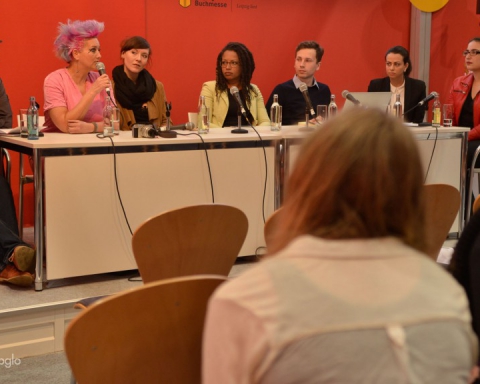Maria found out she was pregnant in March 1966. Her husband was José, a carpenter who was constantly drunk and didn’t earn enough to support the two of them, let alone a third member coming into the family. She said the son was his, because he’d never believe that an angel had “planted the seed.” Although news of the pregnancy had made him upset, José started drinking less and also beating his wife less often, as if by divine intervention.
For nine months Maria continued her tough routine working as a cleaning lady in any house she could find in the middle- and upper-class neighborhoods of Rio de Janeiro.
But everyday she’d walk downhill from the favela joyfully singing, for she carried in her womb a quite special fetus – a fetus that she knew for sure one day would turn into a boy and finally into a man who would save the world in some way. She wondered if he’d have to die too. She hoped that the story wouldn’t repeat itself. In any case, her son would be someone, in contrast to her husband. She would also feel important, despite not being as pure as the original Maria.
On the evening of December 24, 1966, Maria was working in one of the houses, when she started having contractions. Her boss, the patroa, had to drive her to a few different hospitals, as one by one they turned out to be overcrowded and the patroa didn’t want to leave her there. They ended up at a private hospital that had room and available doctors, but the patroa was refusing to pay what she referred to as an “exorbitant price” for the baby to be delivered. Just as she was about to drive Maria to yet another public hospital, Maria started giving birth right there on the floor near the reception counter. A nurse took Maria to a modest service room and helped her through the birth. Patients and visitors crowded into the very small room, gawking at the big healthy luminous black baby with the thin, pale-skinned mother.
Maria didn’t bother trying to call José. She knew he’d probably be too busy, angry, or passed out.
Two days later, when Maria and the newborn returned to the little makeshift house where she lived with José, the couple had a big fight. It was obvious to José, who was also white, that this couldn’t be his son. She then told him:
“This child here is the Messiah! An angel brought him to me…”
“Messiah my ass,” José shouted. “As if it’s not bad enough that you screwed some black guy behind my back, you continue to take me for a complete fool! Now you’re gonna get it GOOD!”
Nothing Maria said could convince José. He beat her like never before. But he didn’t harm the baby. On the contrary: Without knowing why, for his heart was full of jealousy and hate, José started crying when he held the tiny baby boy, and delicately put him to bed on the couple’s mattress. After this, he walked out the door and never returned. Some say he died a while later on the side of the road.
Jesus da Rocinha, as Maria’s son came to be known, was very different from Jesus of Nazareth. Jesus da Rocinha was Afro-Brazilian and wore dreadlocks, while the Middle-Eastern Jesus of Nazareth was, at least in the paintings, alabaster-skinned and wore long, golden-brown, slightly wavy locks. Jesus da Rocinha didn’t get to defend a prostitute from being stoned, but he did take a bullet for the young “drug mule” with whom he was enamored.
Jesus da Rocinha was homosexual and an atheist, and also a son of God. Like the Jesus of Nazareth we are taught about, he spent his life fighting for ideals of harmony and solidarity. He performed small miracles in his daily life in the favela, which unfortunately will be forgotten. His mother worked day and night so that he could spend time in school learning to read and write and play sports, and poured her savings into piano and basic medicine lessons for him. Jesus da Rocinha used his knowledge to teach others in the favela and to save lives. He became the most beloved member of the community.
But no one will teach about Jesus da Rocinha in school or in big sacred books. No shrines will be erected. He won’t get a statue at the top of a Rio de Janeiro hill, where he grew up.

Jesus da Rocinha turned 33 shortly before New Year’s, 1999. He went to an urban beach in Rio with his mother and 12 friends. When midnight struck and everyone was celebrating the turn of the millennium, Jesus da Rocinha felt a sharpness tear through his chest: He’d been hit by a stray bullet. Once again a shot not meant for him, but this time a fatal one. He died with the joy of New Year’s Eve stamped on his face.
Maria couldn’t bear the pain. She walked into the ocean and drowned in the waves, which were ferocious that night.
During the funeral the favela dwellers organized for Jesus da Rocinha, a friend of Maria’s commented:
“Maria used to say that her son was just like the real Jesus, brought by an angel. I think I believe her…”
“It was not exactly an angel, dear,” another, closer friend replied, in a hushed voice. “There was a sailor named Gabriel – the only happy night of her life…”
Maria’s body was never found. Some could’ve sworn they saw a strange light above the ocean – but not like fireworks – the night mother and son died.
*The original version of this fictional story was published in December 2001, in Portuguese, on the journalism and social and political opinion Web site Direto da Redação, which ran for more than a decade and for which I wrote for several years. I have made some modifications to the story since. Interestingly, I only got to know the Brazilian classic sung in the video below after writing my original text, but it tells a similar tale to the one I wrote. The revised ending to the story has been inspired by the song, which has become one of my favorites.










